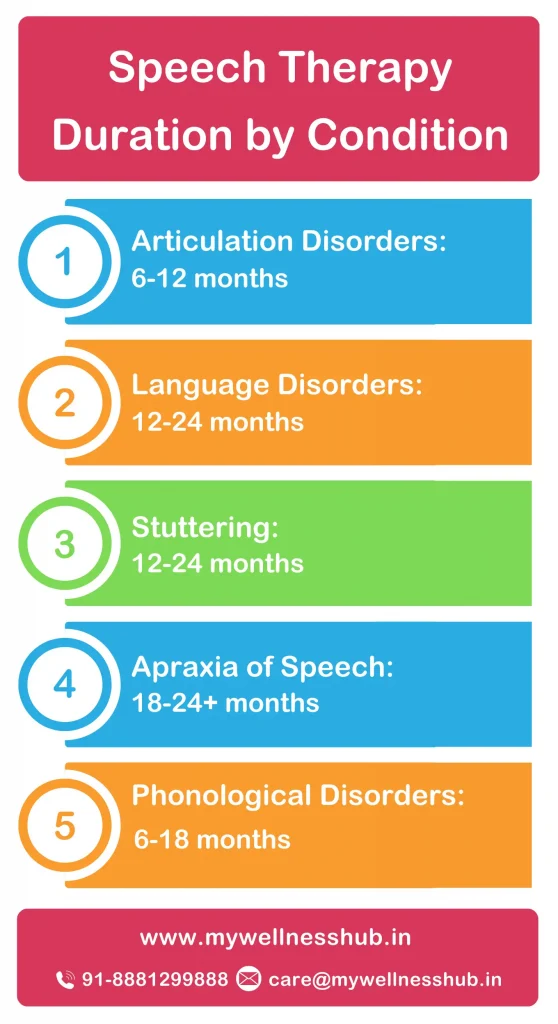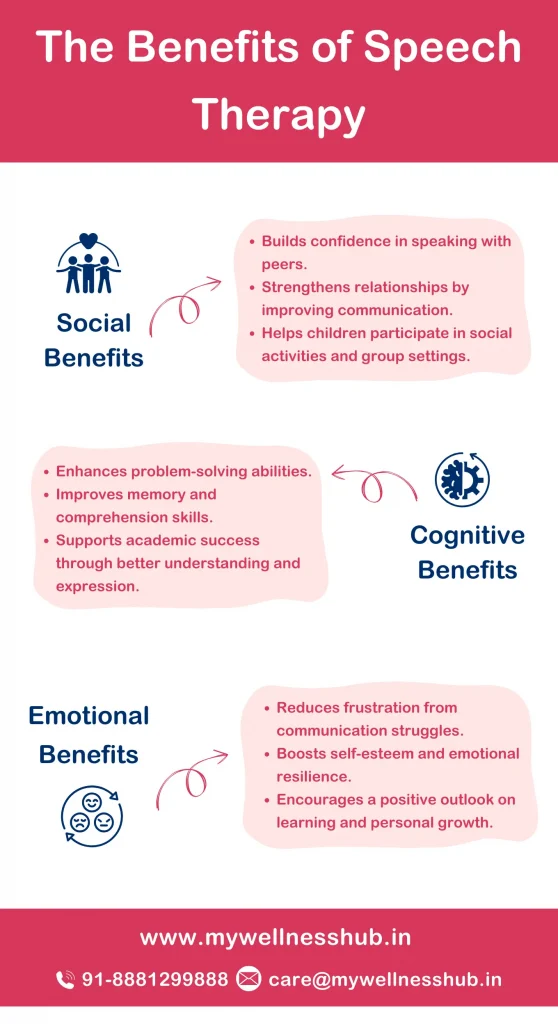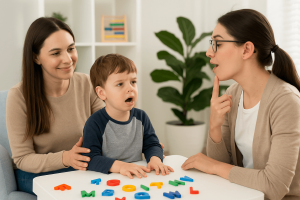How Long Will My Child Need Speech Therapy?
By Rajini D
Last Updated: February 23, 2024
Starting speech therapy for children often comes with questions, especially: “How long will it take?” Every child’s journey is unique, and understanding the process can ease your concerns. This guide simplifies the key factors that influence therapy duration and shares practical tips to make it effective. Whether you’re a parent seeking clarity or a therapist planning sessions, we’ll help you set realistic expectations and celebrate progress along the way. With insights grounded in expert knowledge, this article ensures you’re equipped for a successful journey in speech therapy for children.
Understanding Speech Therapy
Definition
Speech therapy is a specialized intervention designed to help children improve their communication skills. It focuses on addressing difficulties with speaking, understanding language, and expressing thoughts clearly. Guided by a qualified speech-language pathologist (SLP), therapy is tailored to each child’s unique needs to ensure meaningful progress.
Scope of Therapy
Speech therapy covers a wide range of communication challenges, including:
- Articulation Disorders: Difficulty pronouncing sounds correctly.
- Language Disorders: Struggles with understanding or using words to communicate effectively.
- Stuttering: Issues with fluency, such as repetitions or prolonged sounds.
- Social Communication Challenges: Difficulty using language in social settings, like making requests or holding conversations.
Whether the issue is mild or complex, speech therapy provides strategies to overcome these challenges.
Outcomes
The goal of speech therapy goes beyond just forming words. It helps children:
Strengthen their overall ability to communicate, boosting self-esteem and academic success.
- Speak more clearly and confidently.
- Engage better in social situations.
- Speak more clearly and confidently.
- Engage better in social situations.
Factors Influencing the Duration of Speech Therapy

Nature and Complexity of the Issue
The type and severity of a child’s speech challenge greatly impact how long therapy may take.
- Articulation Disorders: These often involve difficulty pronouncing certain sounds and may take a shorter duration to address, especially if only a few sounds are involved.
- Apraxia of Speech: A motor speech disorder requiring intensive therapy due to its neurological nature.
- Stuttering: Progress varies, depending on severity and individual response to therapy techniques.
- Language Delays: Delays in understanding or using language may take longer, especially if paired with other developmental challenges.
Below is a quick summary of typical therapy durations for common conditions:
| Speech Challenge | Typical Duration | Notes |
|---|---|---|
| Articulation Disorders | 6-12 months | Varies by number of sounds and practice at home. |
| Language Disorders | 12-24 months | Early intervention accelerates progress. |
| Stuttering | 12-24 months | Consistent practice and techniques are key. |
| Apraxia of Speech | 18-24 months | Requires intensive and repetitive sessions. |
| Phonological Disorders | 6-18 months | Depends on disorder complexity and practice. |
| Receptive/Expressive Language Disorders | 12-24 months | Focuses on understanding and producing language. |
Frequency and Intensity of Sessions
How often and how intensively a child attends therapy sessions significantly influences progress.
- Frequency: Weekly sessions are common, but children with severe challenges may benefit from multiple sessions per week.
- Session Length: Younger children often have 30-minute sessions to match their attention spans, while older children may have sessions lasting up to 60 minutes.
- Impact: Regular, consistent therapy ensures skills are reinforced, helping the child make steady progress.
Early Intervention
Starting speech therapy early makes a significant difference.
- Benefits: Younger children’s brains are more adaptable, allowing them to learn and retain skills faster.
- Outcomes: Early therapy often reduces the overall duration and helps prevent speech challenges from impacting social and academic development.
Comorbid Conditions
When speech challenges are combined with other conditions, therapy duration may be extended.
Customized Plans: Tailored therapy strategies ensure the child’s unique needs are addressed comprehensively.
Examples: Children with autism, hearing impairments, developmental delays, or Down syndrome may require more time and specialized approaches.
Parental Involvement
Parents play a crucial role in accelerating therapy outcomes.
- At-Home Practice: Reinforcing skills at home through fun activities and everyday interactions is vital.
- Collaboration: Working closely with the speech therapist ensures that home practice aligns with therapy goals.
- Impact: The more involved parents are, the faster children can make progress, embedding new skills into daily life.
Typical Timelines for Speech Therapy
Guidelines for Duration
1. Articulation Disorders (6-12 Months):
Children with articulation disorders often struggle to pronounce specific sounds. Therapy for such issues typically lasts 6 to 12 months, depending on the number of sounds being addressed and the child’s consistency in practicing at home. For example, a child needing help with only one or two sounds may progress faster than one working on multiple sounds.
2. Language Disorders (12-24 Months):
Language disorders, which affect a child’s ability to understand or use words effectively, may require longer therapy. Early intervention can significantly reduce the duration, but persistent or complex cases may need up to two years of focused therapy.
3. Stuttering (12-24 Months):
Therapy for stuttering varies depending on its severity and the child’s response to treatment techniques. Consistent sessions combined with regular practice at home often lead to noticeable improvements within a year or two.
4. Apraxia of Speech (18-24+ Months):
Apraxia, a neurological condition that affects speech planning and coordination, requires intensive and repetitive therapy. Progress is steady but may extend beyond two years due to the need for frequent sessions and practice.
5. Phonological Disorders (6-18 Months):
These disorders involve patterns of sound errors and may take 6 to 18 months to resolve. Consistent therapy sessions, combined with daily practice, are crucial for success.
Know more about our article on Identifying Phonological Disorders: Expert Tips for Parents
The Benefits of Speech Therapy

Impact Beyond Communication
Speech therapy offers far-reaching benefits that extend beyond helping children speak clearly. By improving communication skills, it enhances:
- Social Connections: Children gain confidence to express themselves, enabling them to form meaningful relationships with peers and family.
- Emotional Well-Being: Overcoming communication barriers reduces frustration and builds self-esteem, fostering a sense of achievement and happiness.
- Cognitive Skills: Speech therapy supports better problem-solving, memory, and attention as children learn to articulate thoughts and process language more effectively.
Resources for Parents
Interactive resources, such as flashcards, are a fantastic way to make speech therapy practice engaging for children.
Flashcards for Kids: Wellness Hub’s Actions Flashcards are thoughtfully designed to improve articulation and vocabulary through playful, interactive exercises. These flashcards serve as an excellent resource for parents to reinforce their child’s learning at home, transforming therapy practice into a fun and meaningful bonding activity.
Professional Guidance
Expert guidance is crucial for effective speech therapy. Wellness Hub offers:
- Home Therapy Resources: From specialized flashcards to engaging therapy materials, Wellness Hub provides tools tailored to your child’s needs.
- Expert Advice: Our team of speech-language pathologists collaborates with parents to create personalized therapy plans, ensuring your child achieves their communication goals.
- Educational Content: Access blogs, guides, and tips to stay informed and actively involved in your child’s progress.
Conclusion
Every child’s speech therapy journey is unique, and progress takes time. Celebrate small victories, stay patient, and remember—each step brings your child closer to confident communication. Your role as a parent is vital. Practicing at home, encouraging your child, and working with their therapist can make a big difference.
At Wellness Hub, we’re here to support you with expert guidance, resources like our flashcards for kids, and personalized therapy plans. Let’s work together to help your child achieve their speech goals. Explore our resources today and take the next step toward effective communication!
Frequently Asked Questions
1. How long will my child need speech therapy?
There’s no one-size-fits-all answer, as it depends on various factors like the nature of the speech challenge, frequency of sessions, and age of the child. However, the guide mentions typical durations for different conditions, ranging from 6-12 months for articulation disorders to 18-24 months for apraxia of speech.
2. What are the different types of speech therapy?
Speech therapy can address various communication challenges, and therapists use different approaches depending on the specific needs. Some common types include articulation therapy, language therapy, fluency therapy (for stuttering), and social communication therapy.
3. How often should my child have speech therapy sessions?
The frequency depends on the individual case, but regular sessions are crucial for progress. The guide mentions that more frequent sessions with consistent practice can lead to quicker improvements.
4. How can I help my child practice speech therapy at home?
Parental involvement is vital. You can integrate practice into daily routines, use technology apps recommended by therapists, keep sessions short and fun, and collaborate with the SLP for tailored activities. The guide provides a sample weekly practice schedule as well.
5. What are some signs that my child might need speech therapy?
If your child is not meeting speech milestones, has difficulty forming sounds or using words correctly, struggles with understanding or expressing language, or faces challenges in social communication, consulting a speech-language pathologist is recommended.
6. How can I find a good speech-language pathologist (SLP) for my child?
Look for an SLP with experience in treating children with similar challenges to your child’s and who uses approaches that align with their learning style. Ask about their qualifications, methods, and success stories.
7. What are the benefits of early intervention for speech therapy?
Younger brains are more receptive to learning, making early intervention potentially more effective. Starting therapy early can lead to quicker and more pronounced improvements, often reducing the overall time needed.
8. How much does speech therapy cost?
Costs can vary depending on factors like the therapist’s qualifications, location, and insurance coverage. Some insurance plans may cover speech therapy, so checking with your provider is recommended.
9. What are some common challenges parents face during speech therapy?
Finding the right therapist, fitting therapy sessions into busy schedules, keeping children motivated to practice, and managing expectations can be some challenges parents encounter.
10. Are there any online resources available for speech therapy?
Yes, there are many websites, apps, and online platforms that offer speech therapy resources and activities. However, it’s important to consult with a qualified SLP before starting any online therapy program.
About the Author:
Rajini, M.Sc., Speech-Language Pathologist (9+ years of experience)
Rajini is a passionate and dedicated Speech-Language Pathologist with over 9+ years of experience, specializing in both developmental speech and language disorders in children and rehabilitation in adults. Driven by a desire to empower each individual to find their voice, Rajini brings a wealth of experience and a warm, genuine approach to therapy.
Currently, at Wellness Hub, she thrives in a team environment that values innovation, compassion, and achieving results for their clients.
Connect with Rajini to learn more about how she can help you or your loved one find their voice.
Book your Free Consultation Today
Parent/Caregiver Info:
Client’s Details:
* Error Message








